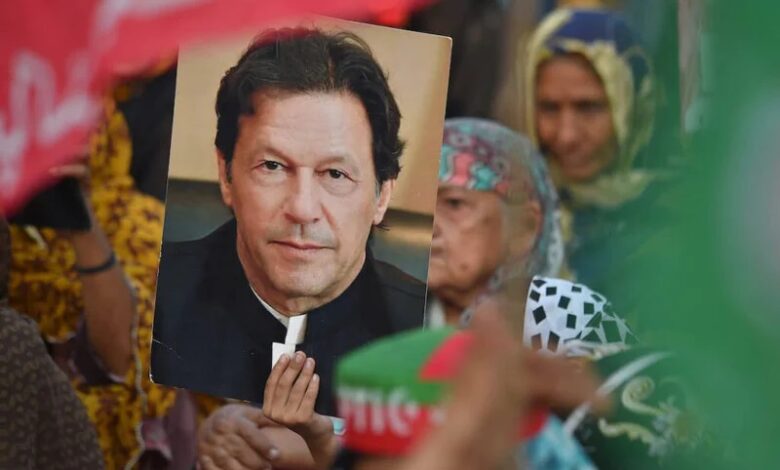The US Toppling of Imran Khan

Prof. Jeffrey D. Sachs*
A principal instrument of U.S. foreign policy is covert regime change, meaning a secret action by the U.S. government to bring down the government of another country. There are strong reasons to believe that U.S. actions led to the removal from power of Pakistan’s Prime Minister Imran Khan in April 2022, followed by his arrest on trumped-up charges of corruption and espionage, and sentencing this week to 10 years imprisonment espionage charge. The political objective is to block Pakistan’s most popular politician from returning to power in the elections on February 8.
The key to covert operations of course is that they are secret and hence deniable by the U.S. government. Even when the evidence comes to light through whistleblowers or leaks, as it very often does, the U.S. government rejects the authenticity of the evidence and the mainstream media generally ignore the story because it contradicts the official narrative. Because editors at these mainstream outlets don’t want to peddle “conspiracy theories,” or are simply happy to be the mouthpieces for officialdom, they give the U.S. government a very wide berth for actual regime-change conspiracies.
Covert regime change by the U.S. is shockingly routine. One authoritative study by Boston University professor Lindsay O’Rourke counts 64 covert regime change operations by the U.S. during the Cold War (1947 and 1989), and in fact, the number was far larger because she chose to count repeated attempts within one country as a single extended episode. Since then, U.S. regime change operations have remained frequent, such as when President Barrack Obama tasked the CIA (Operation Timber Sycamore) with overthrowing Syria’s President Bashar al-Assad. That covert operation remained secret until several years after the operation, and even then, it was hardly covered by the mainstream media.
All of this brings us to Pakistan, another case where evidence points strongly to U.S.-led regime change. In this case, the U.S. desired to bring down the government of Prime Minister Imran Khan, the charismatic, talented, and hugely popular leader in Pakistan, renowned both for his world-leading cricket mastery and for his common touch with the people. His popularity, independence, and enormous talents make him a prime target of the U.S., which frets about popular leaders who don’t align with U.S. policy.
Imran Khan’s “sin” was to be too cooperative with Russian President Vladimir Putin and Chinese President Xi Jinping, while also seeking normal relations with the United States. The great mantra of U.S. foreign policy, and the activating principle of the CIA, is that a foreign leader is “either with us or against us.” Leaders who try to be neutral amongst the great powers are at dire risk of losing their positions, or even their lives, at U.S. instigation, since the U.S. does not accept neutrality. Leaders seeking neutrality dating back to Patrice Lumumba (Zaire), Norodom Sihanouk (Cambodia), Viktor Yanukovych (Ukraine), and many others, have been toppled with the not-so-hidden-hand of the U.S. government.
Like many leaders in the developing world, Khan does not want to break relations with either the U.S. or Russia over the Ukraine War. By sheer coincidence of prior scheduling, Khan happened to be in Moscow to meet Putin on the day that Russia launched the special military operation (February 24, 2022). From the start, Khan advocated that the conflict in Ukraine should be settled at the negotiating table rather than on the battlefield. The U.S. and E.U. arm-twisted foreign leaders including Khan to fall into line against Putin and to support Western sanctions against Russia, yet Khan resisted.
Khan probably sealed his fate on March 6 when he held a large rally in northern Pakistan. At the rally, he berated the West, and especially 22 EU ambassadors, for pressuring him to condemn Russia at a vote in the United Nations. He also excoriated NATO’s war against terror in next-door Afghanistan as having been utterly devastating to Pakistan, with no acknowledgement, respect, or appreciation for Pakistan’s suffering.
Khan told the cheering crowds, “EU ambassadors wrote a letter asking us to condemn and vote against Russia… What do you think of us? Are we your slaves … that whatever you say, we will do?” He added, “We are friends with Russia, and we are also friends with America; we are friends with China and with Europe; we are not in any camp. Pakistan would remain neutral and work with those trying to end the war in Ukraine.”
From the U.S. perspective, “neutral” is a fighting word. The grim follow-up for Khan was revealed in August 2023 by investigative reporters at The Intercept. Just one day after Khan’s rally, Assistant Secretary of State for the Bureau of South and Central Asian Affairs Donald Lu met in Washington with Pakistan’s Ambassador to the U.S., Asad Majeed Khan. Following the meeting, Ambassador Khan sent a secret cable (a “cypher”) back to Islamabad, which was then leaked to The Intercept by a Pakistani military official.
The cable recounts how Assistant Secretary Lu berated Prime Minister Khan for his neutral stance. The cable quotes Lu as saying that “people here and in Europe are quite concerned about why Pakistan is taking such an aggressively neutral position (on Ukraine), if such a position is even possible. It does not seem such a neutral stand to us.”
Lu then conveyed the bottom line to Ambassador Khan. “I think if the no-confidence vote against the Prime Minister succeeds, all will be forgiven in Washington because the Russia visit is being looked at as a decision by the Prime Minister. Otherwise, I think it will be tough going ahead.”
Five weeks later on April 10, with the U.S. blunt threat hanging over the powerful Pakistani military, and with the military’s hold over the Pakistani parliament, the Parliament ousted Khan in a no-confidence vote. Within weeks, the new government followed with brazenly manufactured charges of corruption against Khan, to put him under arrest and prevent his return to power. In an utterly Orwellian turn, when Khan made known the existence of the diplomatic cable that revealed America’s role in his ouster, the new government charged Khan with espionage. He has now been convicted on these charges to an unconscionable 10 years, with the U.S. government remaining silent on this outrage.
When asked about Khan’s conviction, the State Department had the following to say: “It’s a matter for the Pakistani courts.” Such an answer is a vivid example of how U.S.-led regime change works. The State Department supports Khan’s imprisonment over Khan’s public revelation of U.S. actions.
Pakistan will therefore hold elections on February 8 with its most popular democratic leader in prison and with Khan’s party the subject of relentless attacks, political murders, media blackouts, and other heavy-handed repression. In all of this, the U.S. government is utterly complicit. So much for America’s “democratic” values. The U.S. government has gotten its way for now—and has deeply destabilized a nuclear-armed nation of 240 million people. Only Khan’s release from prison and his participation in the upcoming election could restore stability.
https://www.commondreams.org/opinion/us-ouster-of-imran-khan
*Jeffrey D. Sachs is University Professor at Columbia University and author of To Move the World: JFK’s Quest for Peace, Random House: 2013.
(This Article was first Published on February 1, 2024 | Common Dreams)






